Oral Sedation Dentistry – Alexandria, VA
Making Oral Surgery a
Stress-Free Experience
Oral surgery takes time, and many patients are nervous about receiving treatment beforehand. It’s no surprise, then, that some need help staying fully relaxed and comfortable during their visit. Here at Northern Virginia Oral, Maxillofacial & Implant Surgery, we offer various kinds of sedation as well as general anesthesia that can help you have a pain and stress-free procedure. Feel free to call us to learn more about the available options for oral sedation dentistry during your upcoming treatment.
Why Choose Northern Virginia Oral, Maxillofacial & Implant Surgery for Oral Sedation Dentistry?
- Multiple Forms of Dental Sedation Available
-
Led by Board-Certified
Oral Surgeons -
Focus on Providing
Quality Patient Care
Oral Conscious Sedation

Oral conscious sedation is usually recommended for lengthier procedures or patients with moderate to severe anxieties. You’ll be provided with some medication to take before your appointment; once it takes effect, you’ll still be awake enough to follow directions, but you’ll also be so relaxed that you’re likely to have trouble remembering anything about your visit afterward. Plan on having someone else drive you home, as the effects will not have fully worn off. If you’d like to learn more about oral conscious sedation in Alexandria, keep reading!
What Is Oral Conscious Sedation?

Oral conscious sedation provides a deeper feeling of relaxation than nitrous oxide, but isn’t quite as strong as IV dental sedation. It’s often the best choice for patients who will be undergoing longer appointments or more complex procedures. It’s also a good option for those who feel particularly nervous before their appointment, since it will begin to take effect before you even arrive at our office! As its name implies, oral conscious sedation is administered via a prescribed pill or liquid medication that you’ll take by mouth. Even though you’ll feel very sleepy and likely won’t remember anything about your appointment afterwards, you’ll remain conscious enough throughout it to answer simple questions.
How Does Oral Conscious Sedation Work?

Once you’ve taken your prescribed oral conscious sedation medication, you will slowly begin to feel relaxed over time. By the time we’re ready to begin your treatment, you will be in a calm and relaxed state of mind. Many patients feel a heavy feeling in their limbs, and some even drift off to sleep during their appointment! However, should you nod off, we’ll easily be able to awaken you. Even though you’ll remain conscious throughout your appointment, you aren’t likely to remember anything about it afterwards. The sedative will remain in your system for a few hours after your appointment has concluded, so you’ll need a friend or family member to drive you home, where you should plan on resting for the remainder of the day.
Are You a Good Candidate for Oral Conscious Sedation?

Most patients are good candidates for oral conscious sedation, but we’ll meet with you beforehand to be sure. During this initial consultation, we’ll discuss your concerns with you, review your medical history, and perform a very brief exam. Generally, we’ll recommend oral conscious sedation for patients who:
- Will be undergoing a lengthy or complex procedure
- Have trouble sitting still for extended periods of time
- Have jaw, neck, or back problems that make sitting in the examination chair uncomfortable
- Suffer from moderate dental anxiety or fear
- Tend to cancel or postpone their appointments out of fear
However, the best way to discover if you’re a good candidate for oral conscious dental sedation is to come see us for a consultation. We’ll be more than happy to help you discover the best way for you to get the care you need comfortably.
Nitrous Oxide Dental Sedation
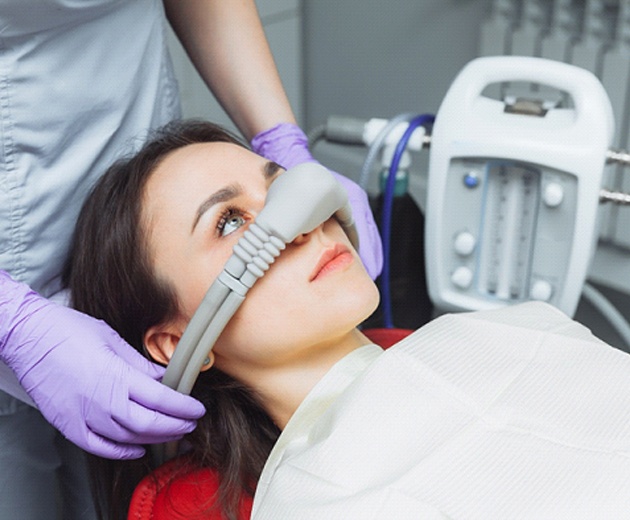
Nitrous oxide is also known as “laughing gas”, which refers to the giddy feeling that it causes while you’re under its effects; you’ll be unbothered by anything going on around you while the surgery takes place. If you’re not very familiar with sedation or you believe you only need mild assistance feeling relaxed during your dental appointment, keep reading to learn more about how the process works and what you can expect ahead of your visit.
Who is a Good Candidate for Nitrous Oxide?

Sedation options like nitrous oxide are incredibly safe, making it ideal for a variety of patients with different concerns. For example, if you have a fear of needles or struggle to remain still while in the dental chair, nitrous oxide can work to relieve these anxieties with relative ease. We may also recommend sedation for those with the following concerns:
- Strong or sensitive gag reflex
- Dental sensitivity
- General anxiety or overstimulation when in the dental office
- Difficulty receiving numbing agents or feeling their effects
How Does Nitrous Oxide Work?
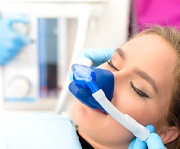
Nitrous oxide is ideal for briefer procedures, and it helps soothe milder cases of anxiety. The way it works is relatively simple. We’ll place a nasal mask over your face once you’re in the dental chair and you’ll breathe in the sedative throughout the treatment. The sedative will take effect almost immediately, helping you feel calm and at ease but still conscious enough to receive directions and tell us about your comfort levels. Because the effects of the sedative dissipate shortly after the mask is removed, you can even drive yourself home without any interruption.
Aftercare for Nitrous Oxide

While you’ll be able to drive yourself home after your appointment, you will need to sit in our office for a few minutes just so we can confirm you’re okay to drive. Once you’re cleared, you can easily continue your day-to-day activities, whether that involves going back to work, school, or running daytime errands. Be sure to take note of any treatment-specific instructions from our dentists to ensure the smoothest recovery possible. We’ll make sure to schedule your for a follow-up to see how you’re doing and if any adjustments need to be made.
IV Dental Sedation
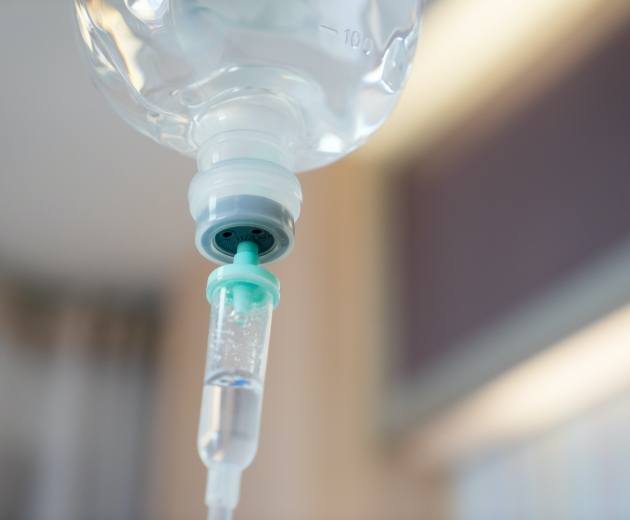
IV sedation is one of the strongest forms of sedation available that still allows patients to stay awake during their treatment. The sedative is delivered into your bloodstream to put you in an advanced state of relaxation. It’s not uncommon for patients to doze off, but you can be awakened very easily. Most people don’t even remember what happened during the treatment, which is good news for particularly anxious patients. If you are interested in IV dental sedation, keep reading or give us a call to schedule a consultation to learn more.
What Is IV Dental Sedation?

IV dental sedation administers a powerful and safe sedative directly into your bloodstream via a small needle on the back of your hand or in your arm. In just a matter of minutes, you’ll achieve a relaxed, dreamlike state and all your anxieties will melt away. You will remain conscious with IV dental sedation, which surprises many patients since the majority report afterwards that it felt as if they slept through their entire treatment. You are very unlikely to form any memories of your appointment, and you won’t register any of the sights, sounds, or sensations that would typically cause you emotional or mental discomfort.
We’ll keep a close eye on your heart rate, breathing, and other vital signs while you’re sedated. If needed, we’ll be able to adjust your level of sedation at any time to ensure you are as safe and comfortable as possible. You will continue to feel extremely groggy for the rest of the day, so you’ll need someone to drive you home after your appointment.
Who Is a Good Candidate for IV Dental Sedation?

Most patients are considered good candidates for IV dental sedation. We will often recommend IV dental sedation for patients who:
- Are undergoing particularly complex treatments, such as dental implant placement or jaw surgery
- Experience moderate to severe dental anxiety or phobia
- Have a very low tolerance for pain or don’t respond to numbing medication alone
- Have a very sensitive gag reflex that makes dental work uncomfortable
- Cannot comfortably sit still in the dental examination chair for very long
However, IV dental sedation is not a good choice for everyone, including patients who are pregnant, on certain medications, or deal with specific medical conditions. We’ll need to thoroughly review your health and medical history before clearing you as a candidate for IV dental sedation.
The Benefits of IV Dental Sedation
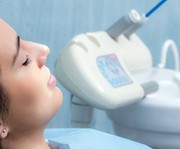
IV sedation offers numerous benefits, such as:
- All the benefits of being “put to sleep” without the risk of being unconscious
- Reliably powerful and effective at preventing discomfort
- Ability to be adjusted at any moment during your treatment
- Relaxing effects that come about right away
- Can help patients with any level of dental anxiety of phobia
IV Sedation FAQs
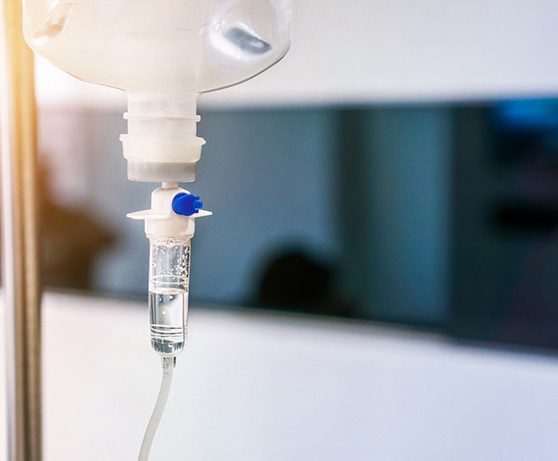
Dentistry can be a difficult prospect for some, but that doesn’t mean you have to forgo the treatments you need to maintain a healthy smile in the process. With IV sedation, the most powerful form of sedation dentistry out there, you can feel completely at ease no matter how fearful you may be. We understand that you may have concerns you’d like addressed first, so feel free to review some of the most common questions we’ve heard over the years as well as our detailed responses. If you have other questions that are not mentioned, please let us know!
Is IV Sedation Safe?
IV sedation is completely safe as long as it is being administered by a professional. Our oral surgeons are highly trained to provide varying strengths of sedation, including general anesthesia, a form of sedation typically reserved for hospital settings. The drugs used in IV sedation have been used in dentistry for many decades and complications are extremely rare and almost never severe even if they do appear. Our team members will closely monitor your vital signs and be right by your side to ensure your safety every step of the way.
What Should You Avoid Before Receiving IV Sedation?
You should not consume any alcohol or use tobacco at least 24 hours before your procedure. Additionally, do not eat anything at least 8 hours prior (or drink anything at least 2 hours prior) to your appointment. If you are currently taking medications, have a small sip of water to ingest them. Please let us know if you have any questions about taking medications on the day of your surgery. You will need to have a friend or family member drive you to the practice as you won’t be able to operate a vehicle after receiving sedation. Wear loose and comfortable clothing and avoid wearing jewelry that could fall off without your knowledge.
Does IV Sedation Come with Any Side Effects?
Keep in mind that with stronger forms of sedation comes a higher risk for side effects, even if they are relatively mild. Some of the most common side effects that come with IV sedation include headache, nausea, and drowsiness, but these are minor in nature, especially compared to stronger treatments like general anesthesia. The immediate effects of the sedative will wear off in the first several hours after your IV has been removed. However, do advise to allow at least 24 hours for the sedative to wear off completely.
Can I Eat Immediately After Receiving IV Sedation?
After receiving IV sedation, you should stick with clear liquids at first and move on to eating soft foods for the first 24 hours if you continue to feel hungry. This includes foods like ice cream, gelatin, pudding, and similar options. Once the initial 24-hour period has passed, you can move on to a softer diet of soups, scrambled eggs, mashed potatoes, soft chicken or fish, and other similar foods for the next few days. Avoid very hard foods like popcorn or nuts.
General Anesthesia
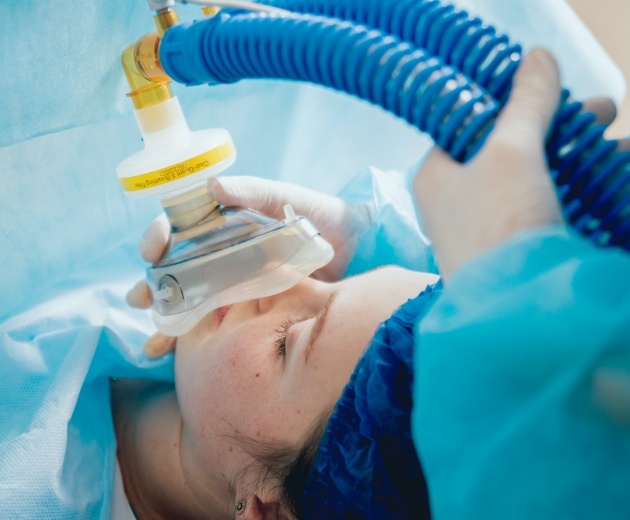
When you think of being put to sleep for surgery, you’re thinking of general anesthesia. This is somewhat like IV sedation, except it keeps you completely unconscious during your procedure. While you’re under the effects of general anesthesia, our team will monitor you to make sure that you stay safe and comfortable the whole time. There are a few steps you’ll need to take to prepare for a procedure involving general anesthesia, and we’ll make sure you’re fully informed of them well ahead of time.
Learn More About General Anesthesia
Oral Conscious Sedation FAQs

Sedation dentistry can make even the most complex dental procedures comfortable. However, it’s understandable if you’re unsure which form of sedation is right for you. If you have questions or concerns about oral conscious sedation specifically, we encourage you to learn more about this sedation method in our FAQ section below. We’ve answered many questions over the years, so you just may find the answer you’re looking for ahead of your appointment!
Is Oral Conscious Sedation Safe?
When administered by a professional, such as any of our highly experienced oral surgeons, you can expect oral conscious sedation to be safe. With that said, some people may not be eligible for oral conscious sedation, such as those who are obese or have obstructive sleep apnea. People with conditions like these are generally at greater risk of experiencing complications following oral conscious sedation. We’ll make sure you are able to receive sedation safely, no matter what strength of sedation you’re considering.
How Should I Prepare for Oral Conscious Sedation?
Preparing for oral conscious sedation is a relatively straightforward process. You’ll want to avoid eating anything about 6 hours before your appointment, making it ideal to schedule your visit in the morning. Be sure to get a good night’s sleep the night before and have a friend or family member drive you to and from the office the day of your procedure. Because the effects take time to fade away, you’ll need to take the rest of your day off after your appointment is complete. If you typically wear jewelry or other valuables, we recommend leaving them at home. Wear loose-fitting clothing for optimal comfort. If you need to have any prescriptions ready after your treatment (such as painkillers), have them filled before your appointment.
How Long Does Oral Conscious Sedation Take to Kick In?
Oral conscious sedation comes in the form of a pill that is consumed orally and takes roughly 20 minutes to kick in. However, this amount of time can vary based on your body weight and other factors, meaning it could take up to 30 minutes in other circumstances. While you can take the sedative at our office, it’s best to take it prior to arriving at our practice and have someone drive you to your appointment. Our oral surgeons will always make sure the sedative has taken effect before beginning your procedure.
How Will I Feel After Oral Conscious Sedation?
Keep in mind that the effects of oral conscious sedation can take several hours to dissipate completely. You’ll still be awake after receiving the sedative, but barely remember any of your appointment when it completely wears off. However, since the effects take hours to go away completely, you won’t be able to drive a vehicle or perform other tasks properly. A general rule of thumb is to wait at least 24 hours before resuming normal activities. Other common side effects include drowsiness, dry mouth, headache, fogginess, and loss of memory.
